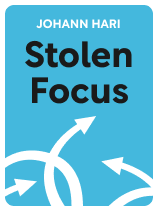

This article is an excerpt from the Shortform book guide to "Stolen Focus" by Johann Hari. Shortform has the world's best summaries and analyses of books you should be reading.
Like this article? Sign up for a free trial here .
How is technology manipulating you? Is it your fault you have trouble focusing?
Johann Hari, the author of Stolen Focus, believes the solutions put forward for the attention crisis aren’t working because they focus on personal responsibility. However, he claims that the tech industry is manipulating you to believe that it’s your fault.
Continue reading to learn more about overcoming technology’s manipulation.
The Individualistic Approach to the Attention Crisis
Technology is designed to reel you in and keep you scrolling. And the tech industry’s preferred approach to fixing your attention is encouraging you to have more self-control so you can resist their tactics. That way, Hari argues, they can frame the problem as a lack of discipline on your part, not intentionally manipulative design on their part.
Hari cites author Nir Eyal’s description of technology’s manipulation approach to fixing our focus. Eyal’s two books, Hooked and Indistractible, show how this approach works:
Step 1: Get you hooked on technology. In Hooked, Eyal explains that the central goal of designers and engineers is to get users dependent on the technology they’ve created. To achieve this, they need to create internal triggers—uncomfortable emotions, such as fear or boredom, that make the user need whatever it is the technology can offer. That way, the user develops a habit and needs the app to satisfy that internal trigger again and again. The stronger the habit, the more the company can rely on that user to provide value for a long time.
Step 2: Make you question your habits, not the technology. In Indistractible, Eyal lays out strategies to insulate yourself from the technology of the mechanisms uses to disrupt your focus. He believes that individuals should critically examine their own habits before going after tech companies. He encourages identifying the personal internal triggers that make you vulnerable to distraction and finding the right strategy to counter them.
Nir Eyal Explains the Difference Between His Books
In an exclusive Q&A with Shortform, Eyal discusses the similarities and differences between Hooked and Indistractible. He dispels the popular interpretation that Indistractible is an antidote to his first book as a trope, although he admits that making the books look and sound similar gives this impression.
He argues that Hooked is about building good habits in customers’ lives. It’s not a guide for tech companies to foster harmful habits. He believes the techniques he shares can be used to make the lives of users better through the habits technology helps them create, such as fitness or spirituality.
Conversely, he claims that Indistractible is about kicking bad habits, regardless of whether technology is the culprit for having them or not. Ultimately, Eyal believes we can take advantage of technology to build good habits and know when to put our devices down so we can get rid of bad habits.
Cruel Optimism
Hari argues that technology manipulation is an example of “cruel optimism.” It’s optimistic because it offers a solution, but cruel because the problem is so much bigger than the solution. According to Hari, cruel optimism accepts that the system can’t change and so it’s worthless to try. But he points out that society has fixed (or at least reduced) systemic problems before. Cruel optimism is a distraction from systemic solutions that can work for more people.
(Shortform note: Lauren Berlant coined the term “cruel optimism” in her book of the same title. One of the examples she cites is the American Dream because it keeps people striving for a certain standard of living when the conditions necessary to achieve that standard are quickly disappearing.)

———End of Preview———
Like what you just read? Read the rest of the world's best book summary and analysis of Johann Hari's "Stolen Focus" at Shortform .
Here's what you'll find in our full Stolen Focus summary :
- The seven factors causing the current attention crisis
- Johann Hari's three-part solution to gaining your attention back
- Why society needs to change, not just individuals






